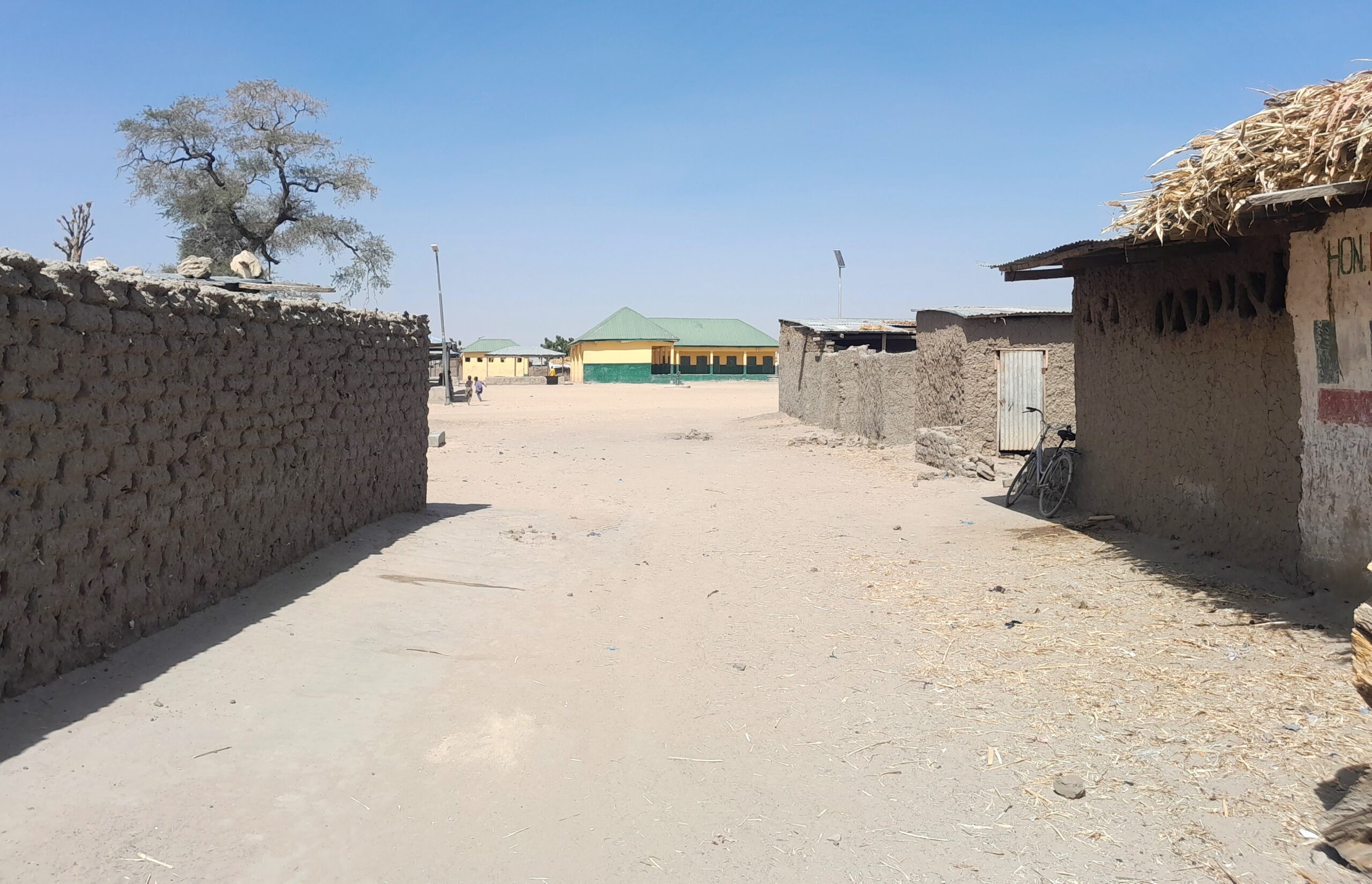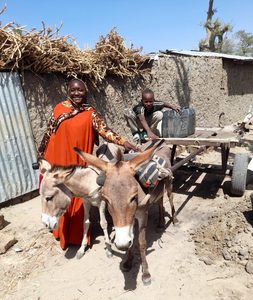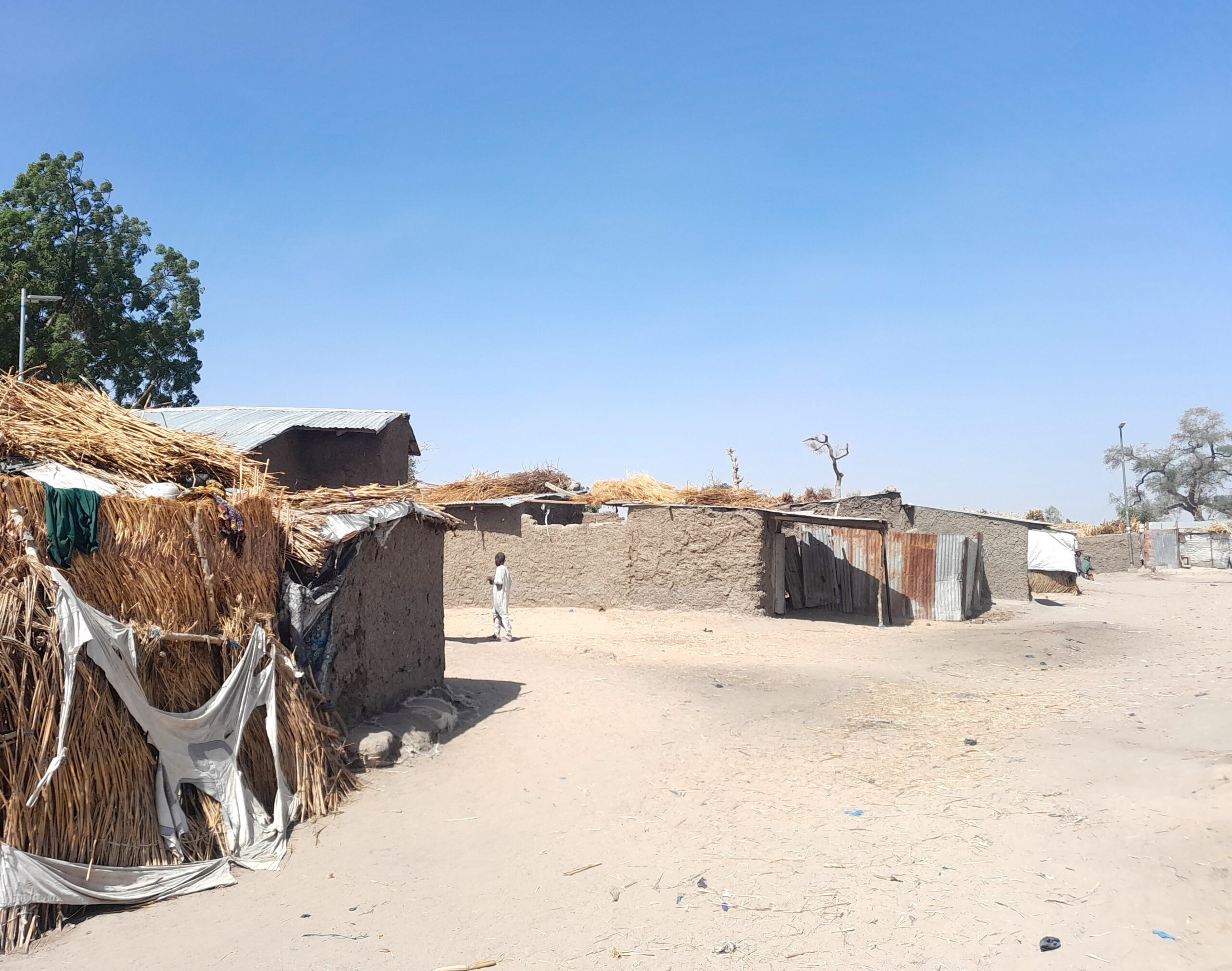A remote town’s story of resilience, hope and education
23 January 2024Visiting a remote town in Borno state, Plan International Nigeria’s Communications Officer, Nubwa Bawuro Ibrahim found a community still struggling under the chokehold of 15 years of conflict in northeast Nigeria and the wider Lake Chad region. She writes on the situation in the community and the effort being made to support their resilience through educational facilities.

This is a remote community nestled in Borno state, some 171 kilometers from the state’s capital-Maiduguri. It is 1 of several scores of communities ravaged by Boko Haram insurgents since 2009, leaving thousands dead and millions displaced.
“The remote town paints a grotesque picture of desolation, isolation, and hardship. The realities of life in this border community are stark. Here, cars are a distant dream, replaced by the slow gait of donkeys and the tireless pedaling of bicycles, invoking the memories of bygone era.”
Nubwa
According to UNICEF, since the start of the conflict, “more than 20,000 people have been killed, more than 4,000 people abducted and 1.7 million remain displaced, most of them in Borno State.
In early 2019, this remote town was overrun by Boko Haram insurgents amid a general increase of attacks in the area and destruction, with many inhabitants fleeing across the border to communities in neighbouring Cameroon.
On 17 January 2017, a Nigerian military jet mistakenly bombed a camp for displaced people in the region, killing at least 52 people including aid workers, and injuring many more, according to BBC reports.
The remote town paints a grotesque picture of desolation, isolation, and hardship. The realities of life in this border community are stark. Here, cars are a distant dream, replaced by the slow gait of donkeys and the tireless pedaling of bicycles, invoking the memories of a bygone era.
We took off by helicopter from Maiduguri, the only safe means of transport to the town, at 11:14 am, which was against the initial 8:15 am scheduled time. This was obviously due to the dusty and hazy weather. It was a to-and-fro-day trip.
This particular trip, my first ever to the remote town, was unusually long as attested to by my fellow passengers who were regulars. It turned out that the pilot had to make detours due to the poor weather, thereby keeping us on air longer than it was supposed.
Desolate landscape
As we approached the helipad, a desolate landscape was revealed, devoid of the characteristic bustle of a community. We disembarked and ventured into the community, and it became clearer to me the seemingly unreal situation; no single vehicle in sight. No motorcycles.
In the company of a colleague, Felicia, we met Musa and Babakaka; 2 community mobilisers with Plan International who live in the town. Babakaka was my guide for the day. I asked him for mobility to our destination, and then he looked at me, smiled, and said: “We have no car here, no Keke NAPEP (tricycle). We only use donkeys.” “Donkeys!?” I exclaimed. I took a deep breath and had the wildest thought about riding on a donkey, something I have never done even though they are found in the community I grew up in. So, I thought; “what if I fell and broke my leg in this desolate place?” I went with the option of walking the long distance from the helipad to the location I was going to interview some Plan International programme participants. It took us 42 minutes of trekking under the desert sun to reach my destination.

street in the town.
The road was dusty with no respite of trees to provide cover. The determination in the eyes of my guide, Babakaka egged me on. I checked my phone and realised there was no service; the only available mobile network was one from Cameroon.
The resilience of the community of an estimated population of about 30,000 resonated through every part of my encounter. Witnessing the bustling market filled with goods from neighbouring Cameroon, the dedication of the bicycle mechanics which is the fastest means of transportation there, and the eagerness in the eyes of the children to learn was evidence that the people of the town remain unbowed.
Two schools for 30,000 people
There are only 2 school buildings; the functional secondary school lacks necessities, forcing some students to learn on the bare floor. The other, a primary school built 9 years ago, stood unused.
Despite these challenges, a beacon of hope shines in the town. The European Commission Humanitarian Aid & Civil Protection (ECHO) funded project being implemented by Plan International is helping to enhance access to quality education and protection services, providing a brighter future for generations to come.

Eleven-year-old Fatima* is among the children who attend the primary school. She said her parents could not afford a uniform, forcing her to attend school in everyday clothes. Like her, most children at the school lack this basic identifier and essential learning tools. This, further makes it difficult to distinguish children heading to school and those who are out of school.
But, amid this, Fatima is still hopeful for a better future. “I want to become a doctor so I can treat people in my community,” she said.
The ECHO project
Through the ECHO project, Plan International is renovating the schools, providing students with furniture, uniforms, and writing materials, and training teachers. The project was starting when I visited in December 2023 to capture the realities on the ground before the project picked up speed.
Even in the face of insurgency, hunger crisis, and unpredictable weather, the determination of the people of this town to thrive remains undimmed.
Humanitarian activities haven’t been much in the town, obviously due to the long-distance, inaccessible roads caused by flooding from the dam in Cameroon and the fear of attack by insurgents.
Another 42-minute trek took me back to the helipad leaving me with a sweet-bitter feeling. As I flew back to Maiduguri where the Plan International Nigeria’s humanitarian hub in the northeast is located, the echoes from the town refused to go away.
The pain in my legs was wiped away by the hope exuded from the eyes of the community members, especially the school head and students I interacted with.
The challenging context of hardship mingled with the inspiring melody of hope and resilience is a story we will certainly visit again soon as Plan International takes lifesaving and long-lasting solutions to hard-to-reach communities across Nigeria.
*Name has been changed.


